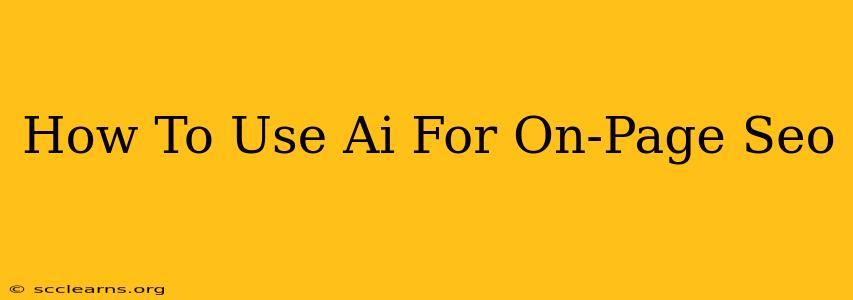AI is rapidly changing the SEO landscape, offering powerful tools to optimize your website's on-page elements and boost your search engine rankings. While AI can't replace human expertise, it can significantly augment your efforts, saving time and improving efficiency. This guide explores how to leverage AI for on-page SEO effectively.
Understanding the Role of AI in On-Page SEO
On-page SEO encompasses all the elements within your website that influence search engine rankings. This includes factors like:
- Keyword Research: Identifying the most relevant keywords your target audience is searching for.
- Content Optimization: Creating high-quality, engaging content that incorporates your target keywords naturally.
- Title Tag and Meta Description Optimization: Crafting compelling title tags and meta descriptions that entice users to click.
- Header Tag Optimization (H1-H6): Structuring your content with clear and concise header tags to improve readability and SEO.
- Image Optimization: Optimizing images with descriptive alt text and relevant file names.
- URL Optimization: Creating short, descriptive, and keyword-rich URLs.
- Internal Linking: Linking relevant pages within your website to improve navigation and distribute link equity.
AI tools can assist in each of these areas, automating tasks, providing data-driven insights, and improving the overall quality of your on-page optimization efforts.
AI Tools for On-Page SEO Optimization
Several AI-powered tools can significantly enhance your on-page SEO strategy. These tools offer a range of functionalities, from keyword research and content optimization to technical SEO analysis. Some examples include:
-
AI-powered Keyword Research Tools: These tools go beyond basic keyword suggestions, analyzing search intent, competition, and keyword difficulty to help you identify the most valuable keywords for your website. They often suggest long-tail keywords, which are less competitive and can drive highly targeted traffic.
-
AI-driven Content Optimization Tools: These tools analyze your existing content and suggest improvements to enhance readability, keyword density, and overall SEO performance. They can identify areas where you can add more keywords naturally, improve sentence structure, and strengthen your content's overall message.
-
AI-based Content Writing Assistants: While AI can't replace human creativity, it can be a valuable tool for generating content ideas, overcoming writer's block, and ensuring your content is optimized for search engines. These tools can help with brainstorming, outlining, and even generating drafts.
-
AI-powered SEO Auditors: These tools crawl your website to identify technical SEO issues, including problems with page speed, broken links, and missing meta descriptions. Addressing these issues is crucial for on-page optimization.
Best Practices for Using AI in On-Page SEO
While AI tools are powerful, it's essential to use them responsibly and ethically. Here are some best practices:
-
Don't rely solely on AI: AI tools should be viewed as assistants, not replacements for human expertise. Always review and edit the suggestions provided by AI tools to ensure accuracy and relevance. Human oversight is critical for maintaining a natural and engaging writing style.
-
Focus on user experience: While optimizing for search engines is important, never compromise the user experience. Prioritize creating high-quality, engaging content that provides value to your audience.
-
Maintain ethical SEO practices: Avoid stuffing keywords into your content just to please AI algorithms. Focus on creating natural, readable content that incorporates keywords organically.
-
Track your results: Monitor your website's performance using analytics tools to see how your on-page SEO efforts are impacting your rankings and traffic. This data will help you refine your strategy over time.
Conclusion: Harnessing AI for On-Page Success
AI is revolutionizing on-page SEO, offering powerful tools to improve efficiency and effectiveness. By understanding how to utilize these tools responsibly and integrating them into a comprehensive SEO strategy, you can significantly enhance your website's visibility and drive organic traffic. Remember to always prioritize user experience and ethical SEO practices to ensure long-term success.

